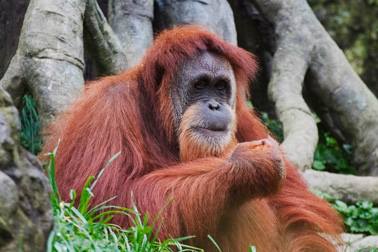 By TreeLiving
By TreeLiving
Orangutans are one of the most unique creatures that are present on this planet. They are a part of the ape species and the only Asian genus of the great ape. Orangutans are the largest living arboreal animals and their arms are much bigger in proportion to their bodies. Something that differentiates Orangutans from other species of primates is that they are one o f the most intelligent primates. They are also capable of using sophisticated tools and are adept in making sleeping nests every night from tree branches, grass and foliage.
The word Orangutan has originated from the Malay words ‘orang’ (man) and ‘hutan’ (forest) that make an Orangutan a ‘man of the forest’. Orangutans are found mainly in Indonesia and Malaysia which are also their natural habitat. They are currently found only in rainforests on the islands of Borneo and Sumatra.
Orangutans are a threatened species. Only two species of Orangutans are surviving in the world today and both of these are endangered. They are the Bornean Orangutan (Pongo pygmaeus) and the highly endangered Sumatran Orangutan (Pongo abelii).
Orangutans face threats due to man made activities like logging, mining, forest fires and the increasing number of roads that destroy their natural habitats making their survival difficult. These activities have increased significantly in the last few years. One of the biggest reasons for the destruction of their habitat is that vast tracts of forest land are being converted into oil palm plantations. These plantations have come up as a result of increasing demand for palm oil for cooking, cosmetics, mechanics and usage of palm oil for bio diesel.
According to wildlife experts and people involved in the conservation of Orangutans, these activities are going to do an irreparable damage to the habitat of Orangutans. It is a sad fact that some of these activities are completely illegal as they take place in national parks that are off limits for loggers, miners and plantation developers.
Orangutans also face threats from poachers due to the demand of preserved orangutan bones sold illegally at various places and cities in Kalimantan, Indonesia. The skulls of Orangutans are also sold in souvenir shops where they can command a price of over $500! Not to mention the illegal pet trade that puts the already endangered species under even bigger danger. There are various wildlife and animal welfare organizations that are working hard to raise awareness about this issue.
Orangutans are genetically and cognitively very similar to human beings. There are many countries that have banned Orangutans from being used as test animals. Various scientific tests have been done on Orangutans and their genome has also been analyzed. All this is going to help people working for the conservation of this species and also get a better understanding related to human genetic diseases.
Learn more about these beautiful creatures and create awareness among everyone you know about the dangers faced by Orangutans and how to help. If you do your bit, it can make a world of difference in advancing the cause of Orangutan preservation around the globe!

